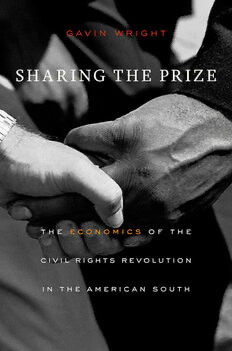
Sharing the Prize: The Economics of the Civil Rights Revolution in the American South PDF
Preview Sharing the Prize: The Economics of the Civil Rights Revolution in the American South
g av in w r i g h t S H A R I N G T H E P R I Z E t he e c o n o m i c s o f t he civil rights re volution in the americ an south SHARING THE PRIZE SHARING THE PRIZE THE ECONOMICS OF THE CIVIL RIGHTS REVOLUTION IN THE AMERICAN SOUTH Gavin Wright The BELKNAP PRESS of HARVARD UNIVERSITY PRESS Cambridge, Massachusetts & London, England 2013 Copyright © 2013 by the President and Fellows of Harvard College All rights reserved Printed in the United States of America Library of Congress Cataloging- in- Publication Data Wright, Gavin. Sharing the prize : the economics of the civil rights revolution in the American South / Gavin Wright. p. cm. Includes bibliographical references and index. ISBN 978- 0-6 74-0 4933- 8 (alk. paper) 1. Civil rights movements— Economic aspects— Southern States. 2. Civil rights movements— Southern States— History—20th century. 3. African Americans— Southern States— Economic conditions— 20th century. 4. Segregation— Economic aspects—S outhern States. 5. Southern States— Economic conditions— 20th century. I. Title. E185.615.W69 2013 323.1196'073075—dc23 2012033549 For Daisy and Agnita CONTENTS Preface ix 1. Civil Rights, Economics, and the American South 1 2. The Po liti cal Economy of the Jim Crow South 32 3. Southern Business and Public Accommodations: An Economic-H istorical Paradox 74 4. Desegregating Southern Labor Markets 105 5. The Economics of Southern School Desegregation 150 6. The Economic Consequences of Voting Rights 183 7. The Downside of the Civil Rights Revolution 223 8. Civil Rights Economics: Historical Context and Lessons 258 Notes 269 Bibliography 303 Acknowledgments 339 Index 341 PREFACE It is customary to open with a remark about how long this study has taken, but the present work may approach an all- time re- cord. My interest in the American South, and in the connection between the race issue and economics, goes back to the summer of 1963, when I traveled to Warren County, North Carolina— a black- majority, tobacco belt county in the northeastern part of the state—t o join a voter registration project sponsored by the American Friends Ser vice Committee. Our interracial group of college students was warmly welcomed by the local black com- munity, and by the end of the summer we felt we had made some progress in laying a foundation for more ambitious registration drives in the future. But we had no sense that revolutionary change was imminent in the South. As wholesome as our efforts were, the deeper problems seemed to be economic in nature, specifi cally the decline in farming and an absence of opportuni- ties for young people, who w ere then leaving the region in large numbers. My realization that I had little understanding of the underlying issues was an important factor in my decision to pur- sue graduate study in economics. Mainstream economics did not have persuasive or satisfying answers to my questions, however, and so I became an economic
